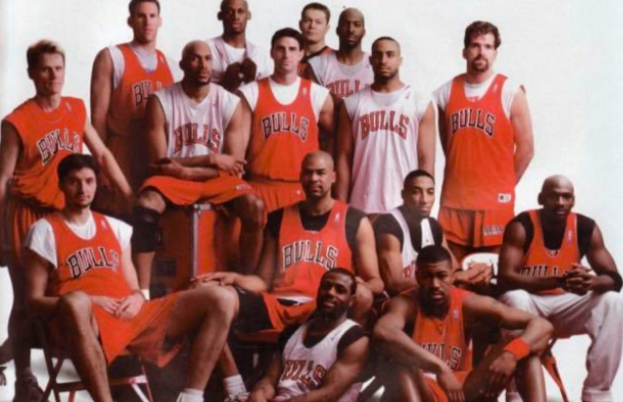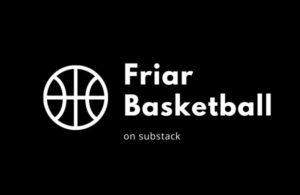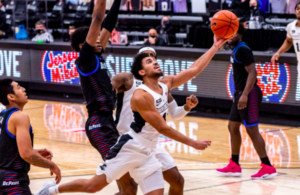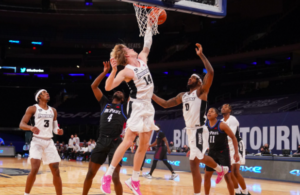- Friarbasketball.com has Moved to Substack!
- Season in Review: Jared Bynum
- Season in Review: Noah Horchler
- Digging in on Al Durham
- The Friar Podcast is a Must Listen
- PC vs. Xavier in 5 Minutes
- Defense is Failing Providence This Season
- UConn/Providence Video Preview with Kevin McNamara
- Jeff Battle and David Duke DePaul Presser
- Noah Horchler Emerging for the Friars
Dickey Simpkins on The Last Dance, Bulls Tenure
- Updated: April 27, 2020

Dickey Simpkins had quite the introduction to the NBA. Months after helping to lead Providence to its first Big East title in 1994, he was drafted by the Chicago Bulls. The Bulls were in transition at the time following the retirement of Michael Jordan in October 1993. By March of ‘95 (Simpkins’ rookie year) Jordan returned to the Bulls and turned the sports world on its head.
After losing to Shaq and Penny Hardaway’s Orlando Magic in the 1995 playoffs, Chicago made history winning three straight NBA championships from 1996-98. In ‘96 they became the first team to win 70 games in a season, finishing 72-10 (Simpkins started 12 games in ‘96). A year later, they won 69 games and their second straight title. The 1997-98 campaign brought the final season of Jordan and Phil Jackson’s tenure with the Bulls — a season that is featured in the documentary that has swept a quarantined country, “The Last Dance.”
Simpkins won three rings with the Bulls after Jordan’s return and spoke with Friarbasketball.com recently to share his thoughts on the documentary, keeping Jordan’s return a secret, teaming with Dennis Rodman, his respect for Phil Jackson, and more.
Simpkins is currently a scout for the Washington Wizards and spent years as a scout in Charlotte when Jordan owned the Hornets.
***
KF: What are your impressions of the documentary so far?
DS: I’ve just been enjoying watching it. It’s been fun to watch. It brings back memories. I think it’s good to see the inside perspective from MJ’s vantage point and mindset throughout the process of winning championships. It has been exciting to watch, especially during this time of global crisis with the coronavirus, it gives another outlet to get your mind away from that.
I’ve enjoyed it, and felt like it has been very accurate to the parts I was involved with during the second three-peat.
KF: You started with the Bulls the year Michael came back. Did you know him prior to his return, and what was it like being a part of the craziness that came with his return?
DS: I got drafted in 1994 and came to the Bulls. I was excited about it, obviously they had just won championships. The Chicago Bulls was a big brand at that point in time, so I was excited about it. I was thinking ‘man, I came a little too late to play with Michael Jordan.’
It’s funny, one day we had practice and I was taking a nap on the couch in the lounge. We would enter the practice facility through the lounge, and I was taking a little nap before practice. All of the sudden the door opens and I was still kind of dazed and asleep and I hear somebody say, ‘what’s up, young fella?’ and he just kept walking. It kind of looked like Michael Jordan, but then I was like ‘I must be dreaming or something.’ I finally got up and went to start getting ready, and as soon as I walked into the training room (I realized) it was MJ.
He was thinking about coming back, and then he came to the facility a couple of times. The next thing I know he was practicing with us in December. We had to keep it under wraps. That was my first experience with being around MJ.
Everything went from zero to one hundred overnight. It was fun to have to be able to keep a secret about him practicing.
KF: Was it overwhelming or intimidating being a rookie playing with Michael Jordan?
DS: For me, it wasn’t overwhelming. I had watched MJ play in college when I was younger because I always watched the ACC and the Big East. I had watched MJ play in the NBA when I was in high school and college, and to be on the same team with him — I guess it could be (intimidating) — but my mother used to tell me “always act like you’ve been there” (chuckles). I kind of always kept that motto. Obviously, it was definitely different with him back on the team, but it wasn’t overwhelming. I embraced it and I embraced the level everything went to — the exposure, the circus, the competitiveness, just the energy. I embraced it and I was excited to be a teammate and learn from the greatest player to ever play the game.
KF: After the loss to the Magic in ’95 it felt like a changing of the guard. Shaq was so dominant, and Penny was destined for stardom before the injuries hit. What was the feeling in the franchise following that loss?
DS: When MJ first came back we felt this tone that the savior was back and we were back to being a championship team, and obviously that was the feeling, that was the perception, and that was the expectation. But again, like anything the transition had to happen. You had to get the transition time for MJ to be back, for everybody to blend back with MJ, there had to be a transition time for MJ to be back to performing how he performed before he left the game.
The way MJ is and his mentality, he just came out of that Orlando series with the mindset of getting everybody on the same page. That summer gave him time to get back to where he was physically and how he was on the court. The mindset of MJ trickled down to the rest of the team with him being our ultimate leader. MJ went into that season with something to prove and everybody fell in line.
KF: A big part of what changed the following season was acquiring Dennis Rodman. Much of this weekend’s documentary focused on him. What was it like being his teammate, and were there concerns among those on the team about his arrival?
DS: I think we all looked at it (the Rodman acquisition) as being kind of strange. At the end of the day that was a decision by management, Jerry Krause and Phil Jackson, and obviously they had a conversation with MJ about the situation. It was kind of strange at first, but once you got past that you started thinking about how if anybody could direct Dennis in the direction of winning it would be MJ, Phil, and Scottie (Pippen).
KF: Could he be considered a good teammate?
DS: D-Rod was an eccentric guy off the court for his marketing brand. As a teammate, he was a good teammate. He communicated on the court, he did his job, he came to play every time it was time to play.
I played three years with Dennis and we had two conversations in three years, which is strange. Dennis didn’t really talk much to anybody, but on the court he talked. I remember at the beginning of the ‘95-96 season he was hurt and I was starting in his position. We were on a road trip and he sat next to me on a plane. I looked over and it was strange because we hadn’t really had any conversations. He asked me how I felt that I was playing, and I told him ‘you know, I feel like I’m playing pretty good’ and was he was like, ‘yeah, you are. You are playing good’ and then he gave me some tips — defending certain guys — I thought that was big.
Our second conversation was in the locker room after our final championship. It’s kind of funny how those were our only two conversations, and then fast forward a couple of years after a Super Bowl party in Phoenix. Dennis and I talked longer at that party than we did in three years playing together. It was great.
KF: I read Phil Jackson’s book “The Last Season” about the end of the Lakers’ run with Shaq and Kobe. In it, he went into great detail about your role on that team, particularly how you were able to so effectively emulate Karl Malone in preparing for the ‘97 and ‘98 finals against the Jazz. Have you seen that part of the book? What separated Phil as a coach?
DS: Somebody had sent me a copy of the page when he talked about my role and my part in preparation for the Jazz series, which was big. I have much respect for Phil, I communicate with Phil from time to time. I respect his ability to coach and he had a really good knack for the mental approach of the game. He had a knack for maintaining a calmness and blending the personalities, blending the egos, blending different brands together for a common goal.
Those were two biggest things, and then when you have the respect of the greatest player to ever play the game that’s just another strength in leading a team.
KF: You weren’t on the Bulls at the beginning of Jordan’s last year with the team, but then returned to Chicago during that season. Was there a noticeable difference in the tenor of the locker room and franchise than before you left?
DS: Before the ‘97-98 season I was traded to Golden State for Scott Burrell. I always joke with Scott about how he needed to continue to thank me for getting him a championship.
That was the season that (Latrell) Sprewell choked (Warriors head coach PJ) Carlesimo, so when they say the grass isn’t always greener on the other side, it was true. They made a move (trading free agent-to-be Joe Smith for Clarence Weatherspoon and Jim Jackson) and then waived me. Then my agent gave me a call telling me Jerry Krause called and that Phil and MJ wanted me back. That was a great feeling. They respected my abilities and respected the fact that I knew the triangle, I knew how to play, and I could fill the role that they needed. They wanted me back, which was big.
KF: What was it like being back?
DS: I came back and Phil caught me up to speed with everything with “The Last Dance” theme. He caught me up to speed with where the energy and intensity was at the time, and then he caught me up to speed with what his expectations were of me and my role.
I wasn’t surprised (about friction between the players/coaching staff and management) because I knew the intensity between Phil and Jerry Krause and MJ and Jerry Krause. I knew all about that intensity before I left after the first two championships. Phil caught me up to speed about how it had gotten to a boiling point where that was going to be the last season of everybody together.
Phil had everybody on the same page about embracing this being the last dance and I felt that when I got there.
KF: What was the biggest reason things soured between Phil and Jerry after they had such a long relationship?
DS: I think it was all motivated by business getting personal and the egos of who is responsible for the championships. Upstairs versus downstairs. Players versus the front office.
When business turns personal it can get real sticky, and that’s what happened. MJ was backing Phil and Jerry felt like, from what I saw, that… there was a disconnect in the type of understanding in who was involved with bringing championships. That’s where it got kind of sidetracked.
KF: Living in New England, there were a lot of parallels I could draw between how the media approached the end of the Patriots’ run and how the documentary portrayed Jordan growing tired about the questions of the end of the Bulls’ run. The Boston media started it a few years prior to last season, and it seemed like the coverage was less about the on-field product and more about when it would all end. Did you feel like this became a distraction for the team?
DS: I never really got that sense. The media is the media. Everybody is looking for a story. That’s just a part of the situation, that’s the nature of the beast.
I’m sure MJ was probably tired of answering questions about the future. I can see how that would be a little irritating, having to always answer all of those questions, but I give it to MJ, he was the ultimate leader and he embraced that and entertained and answered those questions to the best of his ability in the moment.
KF: Lastly, how did your relationship with Michael evolve over time?
DS: When he came in I was a young guy and he saw how I was working hard and playing my role. We developed a level of respect that grew into a friendship. That respect and friendship grew into him calling me to come work for him and to this day there is still a high level of respect and friendship. It all started just from him seeing me being a young guy working hard — that built the respect that started the friendship. If you just did your job and worked hard, he was going to respect that.




You must be logged in to post a comment Login